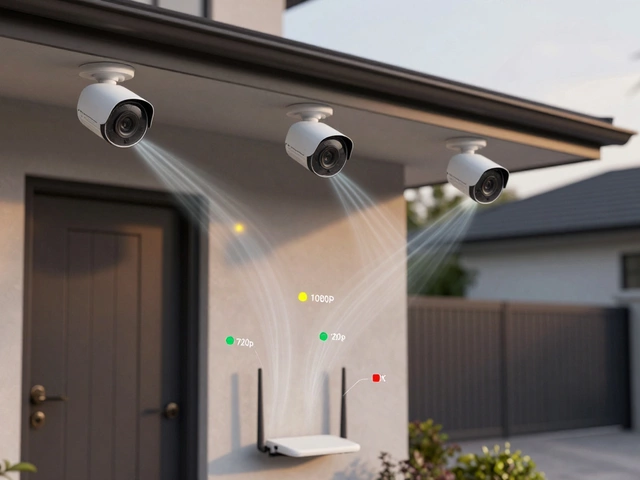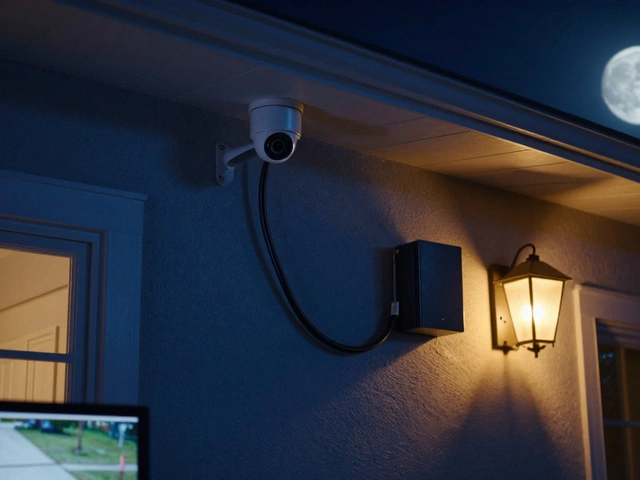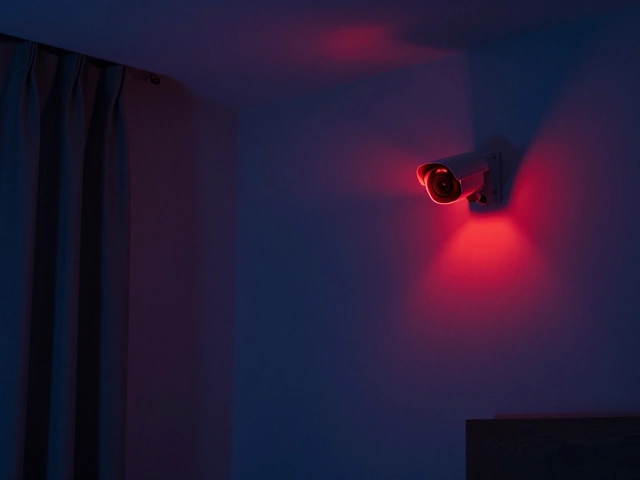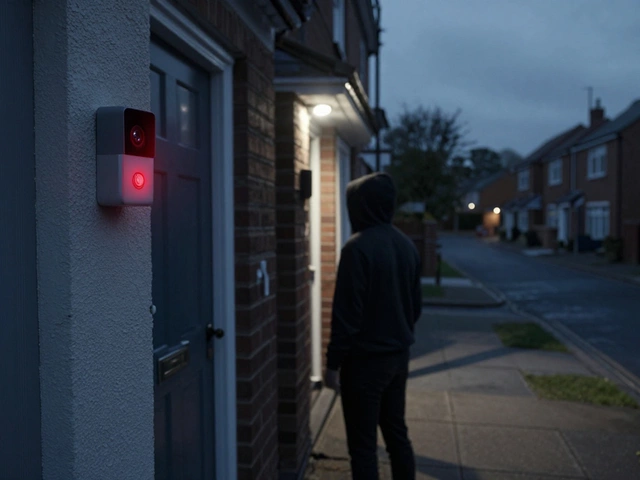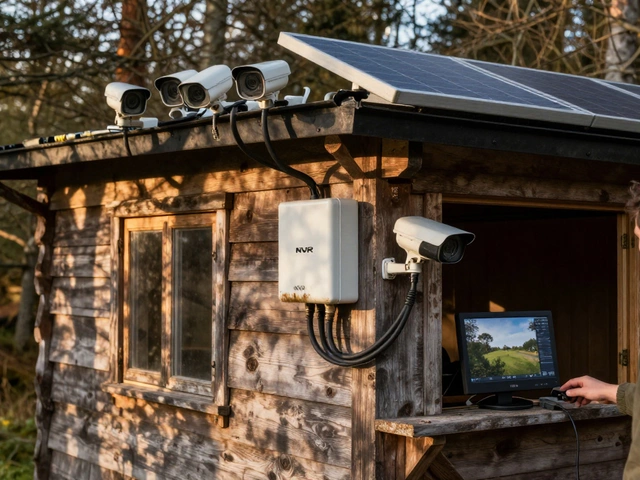It’s easy to assume that security cameras are just for big businesses or the super-rich. Not true at all. These days, plenty of regular folks—even my neighbor with three chihuahuas—have cameras pointed at their front doors. But the big question is: how much will it really set you back to get them installed?
Here’s the lowdown—costs swing wildly. If you just want one basic indoor camera, you could walk out of a store for less than a hundred bucks. Want a whole system with several outdoor cameras, night vision, or phone alerts? The price can jump fast, especially if you call in the pros.
But before you start wondering if you have to sell your old smartphone to pay for this, let’s break down what actually goes into the cost. A bunch of factors matter: camera quality, number of cameras, wired vs wireless, and what kind of installation work your place needs. Understanding this stuff can save you a big chunk of change—and help you dodge some common mistakes people always make when choosing their camera systems.
- What Affects CCTV Installation Cost?
- Equipment: Camera Types and Price Ranges
- Professional Installation vs DIY Costs
- Hidden Fees and Common Surprises
- Money-Saving Tips and Smart Choices
- Is a Professional CCTV System Worth It?
What Affects CCTV Installation Cost?
The price tag on getting cameras set up at your place isn’t just pulled out of thin air—there are a bunch of solid reasons for the difference between a cheap DIY cam and a full-blown professional system. Here are the main things that mess with cctv installation cost:
- Number of cameras: Obvious, but worth saying—the more cameras you add, the more you pay. Two or three might be fine for a small apartment, but a big house can need six, eight, or even more for full coverage.
- Camera type: Bullet, dome, PTZ (pan-tilt-zoom), wired, wireless—each comes with its own price. PTZ cameras especially can cost a lot more because of their fancy features.
- Video quality: Cameras with 4K or high-definition are far pricier than basic 720p ones. If you want to see faces or license plates clearly, you’ll pay extra for that clarity.
- Indoor vs outdoor: Outdoor cameras need to survive rain, wind, and sun, so they usually cost more, especially if you want night vision or weatherproofing.
- Wired vs wireless: Wired setups need more labor (drilling, cabling), but they’re less likely to have signal issues; wireless is faster to set up, but sometimes needs special batteries or WiFi extenders.
- Installation difficulty: Single-story homes are easier (cheaper) to install in than three-story houses or offices, especially old places with tough walls or awkward attic spaces.
- Extra features: Things like motion detection, cloud storage, remote access from your phone, or smart integration (think Alexa or Google Home) all add to the tab.
Here’s a quick table showing typical price ranges for the most common factors that shape your final bill:
| Factor | Typical Cost Range (per unit) |
|---|---|
| Standard indoor camera | $30–$150 |
| Outdoor (weatherproof) camera | $80–$300 |
| PTZ or advanced camera | $200–$800 |
| Professional installation (per camera) | $100–$250 |
| Wired system (labor & materials) | $500–$2,500+ (4–8 cameras) |
| Wireless system (labor & materials) | $300–$1,200 (4–8 cameras) |
One tip: always ask installers if they’ll do a free site survey. Some will walk through your property and spot tricky spots that’ll need extra hardware or cables. It beats finding out the hard way when the quote jumps up last minute. The bottom line is, the smoother it is to install, and the fewer fancy extras you want, the less you’ll pay.
Equipment: Camera Types and Price Ranges
Choosing the right camera makes a huge difference not just in security, but also in how much you’ll pay. The market is all over the place, from $30 plug-and-play models you can buy at big-box stores, to professional-level gear that can run over a thousand bucks per camera. Here’s what most people run into:
- Basic indoor cameras: These start around $30-70 each. They usually plug into a wall, connect to Wi-Fi, and offer app monitoring. No wires needed.
- Outdoor bullet cameras: Typical price is $50-150 per camera. Weatherproofing, better zoom, and night vision cost extra. These look like little tubes and are hard to miss, which is often the point.
- Dome cameras: Priced $60-200. You’ll see these in stores and offices. They’re tough, don’t call much attention, and work well outdoors or indoors.
- PTZ (Pan-Tilt-Zoom) cameras: These are for folks who want to move the camera remotely and zoom in. Expect to pay $200 to $500 or more each. Businesses use these a lot for parking lots.
- Wireless battery cameras: Cost around $80-200 apiece. Super simple DIY. Good for renters or anyone who doesn’t want to run cables.
And then you’ve got the extras. Night vision and audio add about $20 to $70 per camera. 4K ultra-HD versions cost more, sometimes double the price of their HD alternatives. Local video storage (like a DVR or NVR recorder) or cloud storage subscription is another thing to plan for—DVR units often cost $100-300, and cloud plans usually run $5-20 per month per camera.
One more thing: some brands sell multi-camera packs at a discount. For example, a four-camera wired HD system with a DVR might go for $250-400 total, while similar individual cameras would be much more expensive put together. Always check if big bundles make sense for your home or shop.
Don’t forget, your cctv installation cost is driven by what you pick here—better cameras mean higher prices, but usually better peace of mind too.
Professional Installation vs DIY Costs
This is where most people hit decision mode. Should you pay a pro to install your cameras, or just do it yourself? The answer depends mainly on your comfort level with wires, ladders, and tech setup. But let’s talk hard numbers.
If you hire a professional, the national average for cctv installation cost in the United States runs between $100 and $200 per camera, just for labor. That doesn’t include the price of the cameras themselves. If you want a whole system—say, four cameras installed around the house—most companies charge between $500 and $1,200 for installation alone. Rates can climb in big cities or for big, complex jobs, sometimes hitting $2,000 or more if you need lots of wiring or have tricky mounting spots.
And what's the DIY route look like? If you’re handy and don’t mind spending a Saturday on the ladder, many wireless kits are designed for easy do-it-yourself setup. You’ll still pay for the cameras, but you skip the labor costs. Some decent wireless systems (with 2-4 cameras) start at around $150-$400 on sites like Amazon or Best Buy. Expect to lose a few hours to the install, but you’ll save a big chunk of change.
- Pros charge for drilling holes, mounting brackets, running wires, setting up your mobile viewing, and testing the entire setup.
- DIY kits usually offer app-based guidance and snap-in camera brackets, which most folks can handle with a basic toolbox.
There are downsides to both: pro installs get done faster and usually look tidier (no ugly wires dangling). If something goes wrong, some installers offer 30- or 90-day warranties on their work. On the flip side, if you mess up your own install, you’re on your own fixing it—unless the camera maker has a solid support hotline.
Here’s a quick comparison:
| Pro Installation | DIY Installation | |
|---|---|---|
| Average Labor Cost | $100-$200 per camera | $0 |
| Time Required | 2-4 hours (for 4 cameras) | 4-8 hours (for 4 cameras) |
| Included Support | Install warranty, pro troubleshooting | Manufacturer’s basic support |
| Skill Needed | None (the pros handle it) | Basic DIY/tech |
| System Setup | Complete: wires, setup, app | Mostly app-based, some manual wiring |
So if you’re just looking for the fastest, cleanest job and don’t mind paying, professional is the way. For hands-on types who want to save cash, or renters who need a moveable setup, DIY is the real winner.
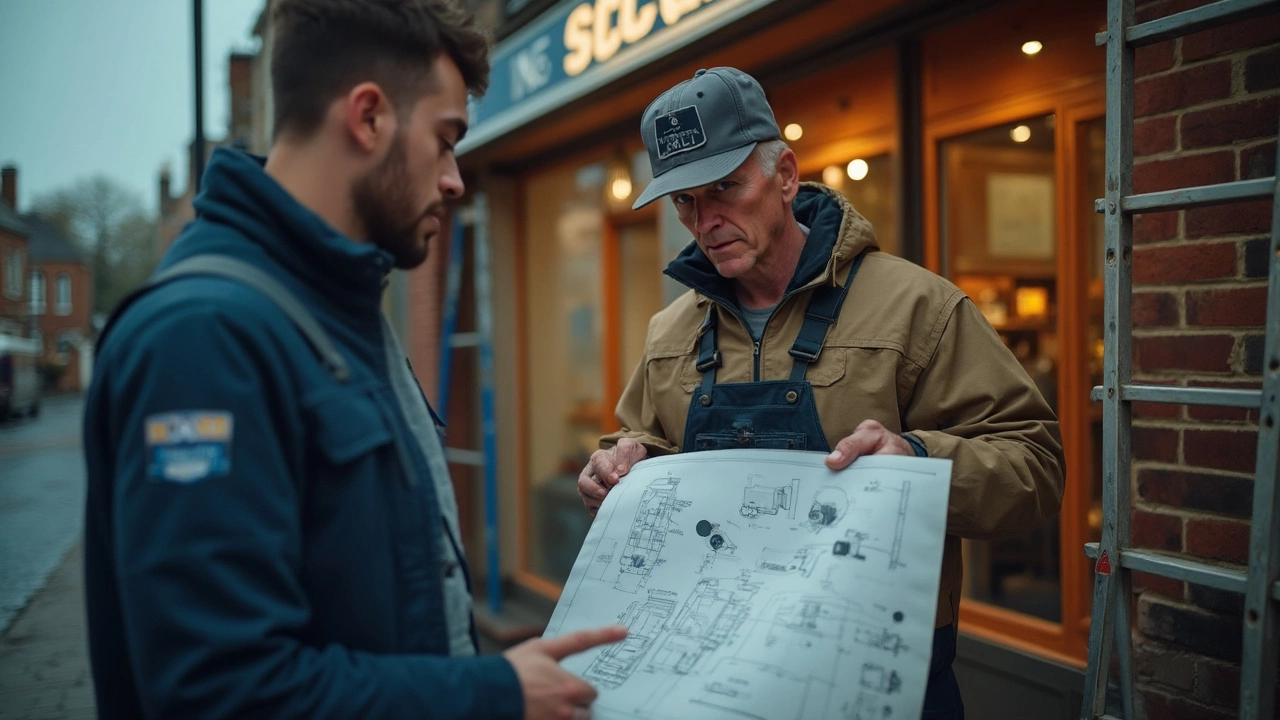
Hidden Fees and Common Surprises
Here’s where people get annoyed. The sticker price for *cctv installation cost* rarely tells the full story. You think it’s simple: buy cameras, pay someone to set them up, done. But a bunch of sneaky extras can creep in and mess with your budget if you’re not paying attention.
One common surprise is the cost of cabling and mounts. Some companies charge extra if your house has thick walls, high ceilings, or weird corners—basically, any spot that's not easy to reach. And if you want your cables hidden for a cleaner look, expect to shell out another $100 to $400, depending on the job size.
Sometimes, basic installation covers only the most straightforward setup—one floor, standard power outlets, no special requests. If you’ve got brick, stone, or older wiring, the installer might add fees for extra labor or drilling through tough materials.
- DVR/NVR equipment fees: Most setups need a DVR (digital video recorder) or NVR (network video recorder) to store footage. These may not be included in the basic camera package, and can add $100 to $400, or even more for high-tech models.
- Service plans and remote access fees: Want to watch your cameras on your phone? Some brands charge a monthly fee for that luxury—usually $5 to $20 per month.
- Software updates or licensing: Some commercial systems add ongoing software costs to keep your setup secure and running smoothly. It’s rare for home cameras, but possible if you go high-end.
- Permits and regulatory fees: Certain cities require permits for outdoor camera installs, and some companies handle that for a fee—anywhere from $25 to $100.
The other thing nobody really mentions: sales tax on expensive gear sneaks up on you, easily adding another 8% or so to your bill, depending on where you live. And don’t forget potential travel charges if you’re outside a big city; some install companies tack on an extra fee just to send someone out to your address.
The best way to dodge headaches? Always ask for an “all-in” or flat-rate quote up front. Make sure it spells out every single charge, from gear to labor to taxes. And if something sounds vague, get it in writing. It’s way easier to confirm the details before you have a bunch of holes drilled in your living room wall.
Money-Saving Tips and Smart Choices
Before you hand over cash for installation, you can trim costs in smart ways without ending up with junk. First, check if you really need a camera for every single corner of your property. For most homes, two to four well-placed cameras cover typical entry points like the front door, back door, and driveway. That’s way cheaper than a system with six or eight units.
Next, decide if you want wired or wireless cameras. Wired cameras need more labor (drilling and running cables), which can double the install price for tricky homes. Wireless options may cost more to buy but save a bundle on installation, especially in older houses with thick walls or weird layouts.
It pays to research brands with good track records. Big names like Arlo, Lorex, and Ring have basic cameras starting around $80, but they often go on sale. Look for bundles—some companies offer packages with three to four cameras and a recorder, bringing down the average price per camera.
Don’t get tricked by monthly cloud storage fees if you can avoid it. Many cameras come with free memory card storage, so you aren’t stuck paying $5–$15 every month just to see your recordings. Plus, most homeowners don’t need 24/7 continuous recording—motion alerts catch the important stuff and use less storage.
DIY installation is another big saver. If you can hang a picture frame or set up a Wi-Fi router, you can probably handle a basic camera system yourself. Most wireless cameras walk you through setup step by step from an app.
- Map out camera locations before you buy to avoid extra units.
- Choose cameras with features you’ll actually use—skip extras like pan/tilt unless you’re really sure you need them.
- Wait for sales or check if local security stores price match online retailers.
- Mix and match brands if you’re tech-savvy (not every system needs to be the same make).
Here’s a quick table showing common cost differences (based on 2024 US averages):
| System Type | Equipment Cost (4 cameras) | Professional Install | DIY Install |
|---|---|---|---|
| Wired | $250–$500 | $400–$800 | Free–$100 (tools/supplies) |
| Wireless | $300–$600 | $250–$500 | Free–$75 |
Big tip: compare package deals online before ordering from a local shop. Sometimes you can find the exact same cctv installation cost for hundreds less if you’re willing to wait a few days on shipping. And if you’re really on a budget, start with one or two cameras and expand later—most modern systems let you add more as needed without starting from scratch.
Is a Professional CCTV System Worth It?
So, after looking at the numbers and options, is hiring a pro to set up your security cameras really worth the cost? For a lot of homes and businesses, the answer is yes—but not always for the reasons people first think. The main benefit: real peace of mind. You know the job’s done right, cameras cover blind spots, and the wiring won’t flake out the first time it rains.
Let’s talk about details. When professionals do the job, they bring the latest tools, know how to hook up systems without ugly cables all over your walls, and test everything to make sure it runs smoothly. If something goes wrong, you usually get some sort of warranty or help line, which is great if you aren’t super tech-savvy and don’t want to be on the phone with customer support for hours.
Here’s how the pros stack up against DIY in real life:
| Factor | Professional Installation | DIY |
|---|---|---|
| Upfront Cost | High ($500-$2,000+ for typical homes) | Low to Moderate ($100-$800 for most kits) |
| Setup Time | Quick (Few hours, handled by installers) | Can be slow (up to a day, especially with cables) |
| Camera Placement | Expert (no blind spots, pro advice) | Depends on your skills & tools |
| Warranty/Support | Usually included (1-3 years) | Mostly manufacturer only |
| Remote Monitoring | Integrated & supported | Depends on product |
It’s not just about cameras. Professional systems can include motion sensors, remote access, cloud storage, and smart notifications. A study from SafeWise in 2024 showed that homes with monitored CCTV are 60% less likely to get broken into compared to homes without any cameras. That’s serious impact—and you can’t put a price tag on being able to prove what happened if something does go down near your place.
But, you shouldn’t pay for more than you need. If you’re in a low-crime neighborhood or just want a camera to keep an eye on your package deliveries, a simple DIY setup can work fine. If you want a system you can really trust, with cameras tucked in the right spots and wired to last, then shelling out for cctv installation cost might just be the smart call. Just make sure you’re not paying for a bunch of features you’ll never use.


